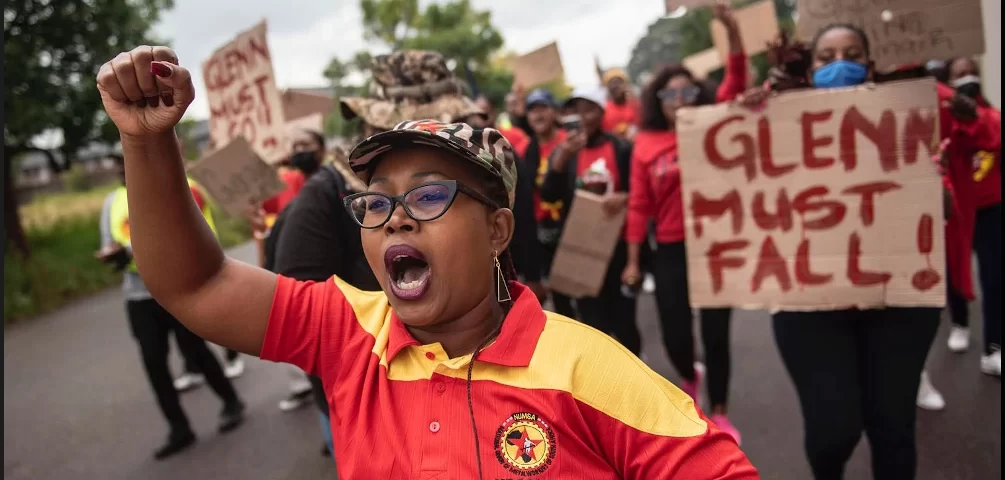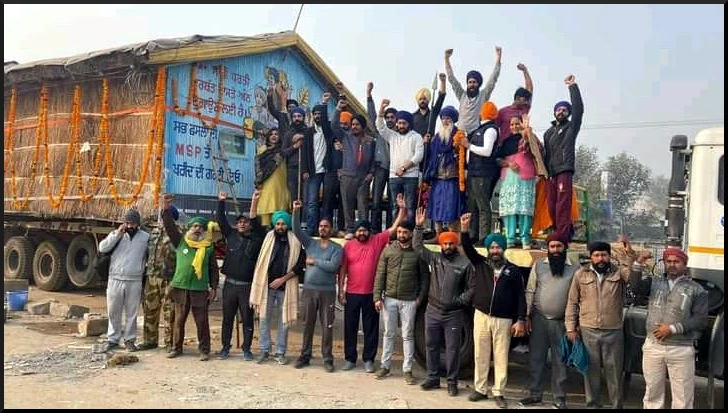by People’s Dispatch, April 30, 2022
May 1 is Global Labor Day. Only in the US was this important celebration of workers moved to a different day.
Working people across the globe are gearing up celebrate International Worker’s Day this May 1. Workers have been participating in monumental struggles since the previous year’s May Day, making this year’s celebration well-deserved. Peoples Dispatch looks back on some of the most important labor struggles of this past year:

In Colombia, the National Strike Committee (CNP), which brought together diverse groups of social movements, organizations and trade unions, presented ten bills in Congress, which included measures to alleviate the worsening socio-economic conditions, protection and security for social leaders, actions against gender-based violence and violence against LGBTQ+ people, financial support to the agricultural sector, and strengthening of education and healthcare. The bills are yet to be debated in the Congress, and are a part of the demands that Colombians will raise this May 1. The presidential candidates on the progressive ticket, Gustavo Petro and Fráncia Marquez, are favored to win after the historic strike.
In Brazil, tens of thousands citizens mobilized en masse across the country against the government of far-right president Jair Bolsonaro and his mishandling of the COVID-19. Brazilians fiercely criticized the Bolsonaro administration for the slow vaccination rate, high levels of unemployment, poverty, inequality and hunger. Much like the Colombian working class, the Brazilian working class is championing progressive candidate Luiz Inácio Lula da Silva in Brazil for the upcoming presidential election.
In Peru, following the presentation of a bill in Congress by President Pedro Castillo, which proposes the writing of a new and inclusive constitution, hundreds of thousands of workers plan to flood the streets across the country to demand its approval.
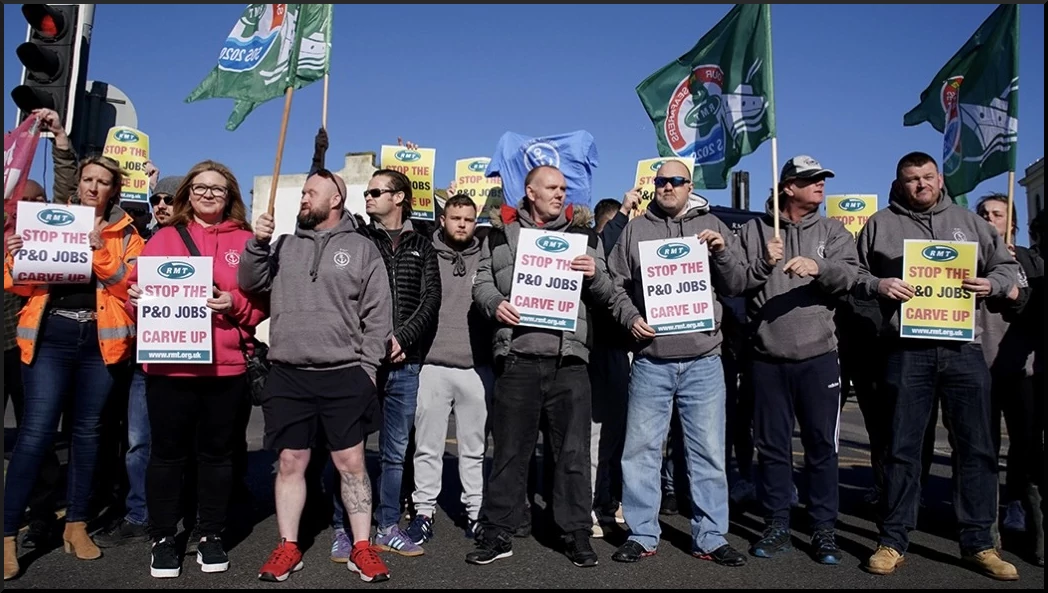
Many corporations in Europe continue to wield anti-worker policies, as we saw in the case of the 800 workers fired at P&O Ferries in the UK. Several governments have also unleashed police repression and smear campaigns against protesting trade unions and leftists, in the case of National Union of Rail Maritime and Transport Workers (RMT) strike in the UK, slandered as pro-Putin sympathizers by the government, or the Unione Sindacale di Base (USB Italia) in Italy which was recently raided by police.
And yet, unions continue to wage struggle. Trade unions and the working classes of various countries including Italy, France, and Greece have organized numerous protests against pro-rich, anti-worker policies of governments during the ongoing COVID-19 crisis. Health workers continue to struggle for decent wages and against the privatization of health services.
The Russia–Ukraine war has had a sizable impact on oil and energy prices which have skyrocketed across Europe, increasing the cost of living for working people. However, even amidst such a crisis, various governments have earmarked billions for military expenditure and continue to supply arms and ammunition to the war front at the expense of the working classes. Trade unions and the broader Left in countries such as the United Kingdom, Albania, Spain, and Belgium have fought back, protesting against war mongering and profiteering. Workers in Italy have refused to transport armaments from Livorno Port and Pisa airport, which were destined to the Ukrainian front. Greek leftists protested the docking of NATO warships in Greek ports and rail workers from the All Workers Militant Front (PAME) abstained from transporting war machinery.

Longstanding, unresolved economic issues have led to workers in Lebanon striking regularly against government inaction. The country of Lebanon has found itself in an extremely dire economic situation which has only gotten worse in the last three years following the outbreak of the coronavirus pandemic and the devastating Beirut port blast which caused hundreds of millions of dollars worth of damage. These issues have exacerbated the myriad of preexisting economic issues facing Lebanese citizens, especially its working class, such as inflation, currency devaluation, rampant corruption and government mismanagement, cuts to subsidies, wages, pensions, and widespread unemployment.
Thousands of immigrant workers in Qatar from poorer South Asian countries, many of whom immigrated to work to build the new infrastructure for the upcoming FIFA World Cup, have also sporadically protested and spoken out against the massive labor violations committed against them by Qatari companies. Human rights groups have estimated that by the time the first match is played, more than 4000 workers would have died in Qatar as a result of the abuse, medical neglect and terrible living conditions. One such former employee, Abdullah Ibhais, who spoke out as a whistle blower against the widespread abuse was persecuted by Qatari authorities. His case attracted international attention towards the state of workers’ rights in Qatar, despite repeated pledges by the Qatari government, promising to improve conditions for migrant workers.
In Egypt, factory workers have regularly gone on strike against nonpayment of wages and dangerous, unsafe conditions. In Saudi Arabia, fishermen in the country’s East decided to go on strike in April at the Gulf region’s largest fish market, to protest the new and arbitrary fees and tariffs recently introduced by the government. The fishermen’s decision was lauded by many as brave due to the fact that such a collective labor action carries grave risks in Saudi Arabia, where the government is known to employ indiscriminate violence to put down any kind of dissent.
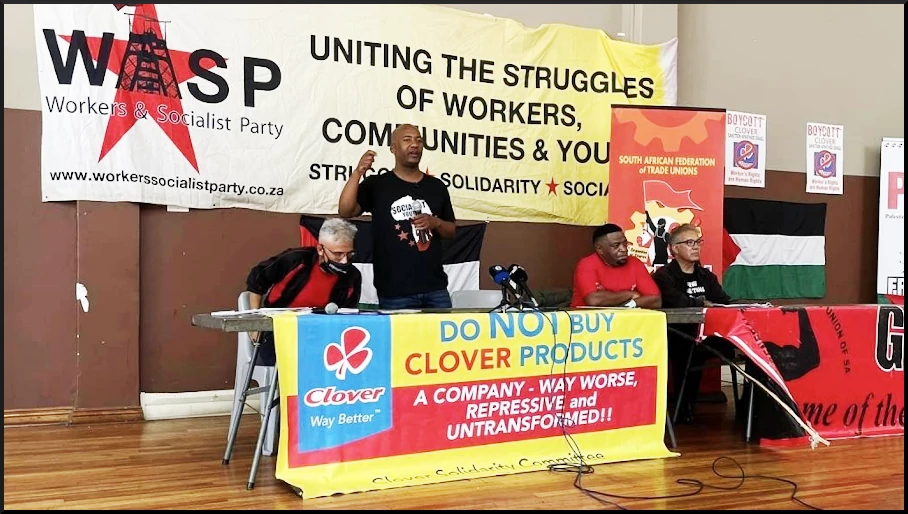
South Africa has erupted in worker’s struggle in this past year. Striking workers at Clover, South Africa’s largest dairy employer, have sustained a strike since November 2nd, 2021. Workers, led by General Industries Workers Union of South Africa (GIWUSA) and the Food and Allied Workers Union (FAWU), have been striking over salary cuts, retrenchments, and austerity measures by the company. Workers have held strong despite enduring petrol bombs and beatings. The strike has been joined by the international Palestinian solidarity movement, which is bolstering workers’ additional demands to nationalize the company, as Clover is majority-owned by an Israeli company.
Earlier in March, the majority of unions at the South African Airways (SAA) decided to take the legal route to force the Department of Public Enterprises (DPE) to disclose the details of the sale of 51% ownership of the state-owned enterprise to a private corporation at an undisclosed price. The National Union of Metalworkers of South Africa (NUMSA) denounced cost-cutting measures by South African airline Comair. Workers in health institutions in several provinces of South Africa have organized protests and industrial actions as they faced threats of job loss and reorganization of services.
In Tunisia, journalists announced a one-day strike on April 2 in protest of governmental interference in public media and to defend the freedom of press in the country. The Nigerian Union of Allied Health Professionals (NUAHP) continued to struggle against missed payments to workers, bad working conditions, and inadequate hazard allowance, particularly for those contributing to the pandemic response.
In the ongoing protracted struggle of the Left forces in Swaziland against the repressive monarchy, the Swaziland police has resumed the persecution of Mbongwa Dlamini, president of the Swaziland National Association of Teachers (SNAT), the country’s largest union.
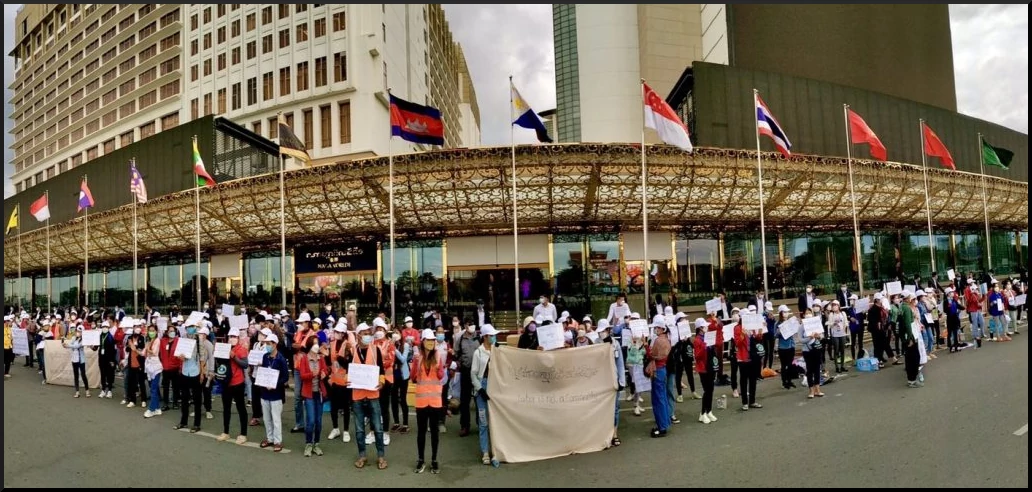
In the Philippines attacks on social movements, including labor organizers, continued unabated in the name of counter-insurgency. In Cambodia, a major strike action by hospitality workers faced widespread repression.
On the other hand, labor movements in Australia organized mass mobilizations against the austerity policies of the conservative Scott Morrison government. Australia also joined a growing group of nations to back a limited waiver proposal on intellectual property rights for COVID-19 vaccines. A large part of the reason why the country backed the proposal was the unceasing efforts by trade unions and health workers campaigning for testing and vaccine access to all. Health workers, especially those working in the aged-care sector, have also been fighting a prolonged battle to acquire some of the fundamental demands of wage hikes, safe staffing, and scheduling.
In November thousands gathered in the capital city of Seoul as part of the national strike organized by the Korean Confederation of Trade Unions. In the words of Steven Lee from the International Strategy Center, “(d)espite the constraints, the workers stand proud, showing both confidence and caution. They have organized safe, peaceful protests in such difficult conditions before, and they will do so again.”
The strike in South Korea coincided with strikes across different sectors from construction workers to doctors and health workers. Workers are set to hold more demonstrations as the conservative Yoon Seok-youl will begin his presidency next Monday.
In India, the historic farmer’s struggle against the Modi government’s contentious farm laws in India came to a victorious end after a year in December 2021.
In the coastal state of Tamil Nadu, protests led by female employees erupted after more than 159 workers fell sick due to mass food poisoning on December 15 at the Foxconn Technology Group’s facility. Workers held a strike over several days, forcing the facility to shutdown for a week. Foxconn eventually conceded victory to the workers. In January this year, villagers in northeast Odisha faced brutal action by over 500 security forces as they resisted the planned land acquisition of 4,000 acres of land by Indian steel and energy corporate giant Jindal Steel Works for an integrated steel plant.
The economic crisis in Sri Lanka catapulted into a national crisis, marked by severe shortages of essential items like food, fuel and medicines. Mass protests have engulfed the island nation since April 9, demanding the end to the ruling Gotabaya Rajapaksa government.
In Pakistan, student politics have risen in prominence once again as the Sindh province government lifted the 38 years old ban on student unions. From sexual harassment at universities and slum evictions to racial profiling of ethnic minorities, the student movement in Pakistan has become an important voice of consciousness and struggle.
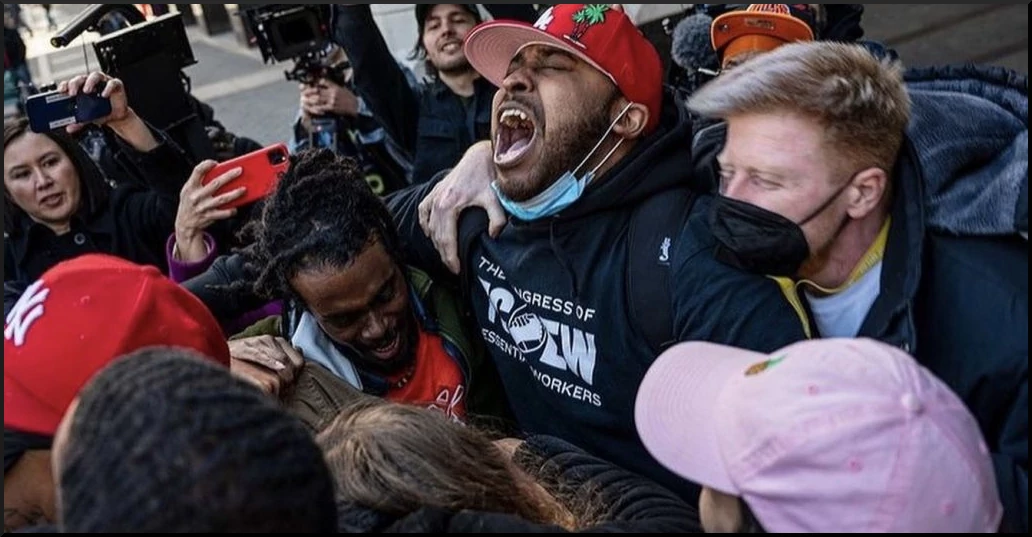
In the United States, unionization drives have taken the enormous service industry by storm. Young Staten Island workers made history when they took on the Amazon corporate giant and won the first Amazon union in the US. Amazon is not only notorious for its multi-million dollar unionizing campaign, but also for its labor rights violations. Amazon workers have been known to urinate in bottles due to an absence of bathroom breaks.
And all across the United States, Starbucks workers are organizing and wielding their power in order to unionize. Thus far, workers have successfully unionized around 40 Starbucks locations. “We all deserve a voice.” said worker and lead organizer Kylah Clay from Boston to Peoples Dispatch. “We all are frustrated, and share our concerns, and we all should be able to have a say in what happens in our workplace.”
*Featured Image: ~ Phakamile Hlubi-Majola on Twitter
Peoples Dispatch, formerly The Dawn News, is an international media project with the mission of bringing to you voices from people’s movements and organizations across the globe
